The MuseFlow Blog
Discover:
Self-Improvement
There are perhaps few things scarier to a musician than focal dystonia. I recently had lunch with a friend who is a professional clarinetist for the San Francisco Ballet, and she mentioned she personally knows about one hundred classically trained musicians who have developed this neurological disorder!
In the sports world this is commonly referred to as the yips, and this disorder affects around 1% of professional musicians across all genres. However, 95% of those cases come from classically trained musicians. Let’s discuss why this happens, and what mitigation efforts you can be put in place so that focal dystonia never presents itself in your performance.

Focal dystonia causes a loss of voluntary motor control in extensively trained movements. The brain develops overlapping neural maps, and musicians can experience cramping, tightness, fatigue, and involuntary muscle contractions. This can make it hard to perform complex instrument movements that musicians have been practicing for years.
Focal dystonia is idiopathic, meaning that “experts can’t point to one factor that causes it.” But some risk factors have been determined. According to Medical Problems of Performing Artists:
- There are higher risks for musicians who play instruments with maximal fine motor skills…like the piano.
- Musicians with anxiety and perfectionist tendencies tend to have higher rates of focal dystonia.
- Genetics is thought to be a contributing factor.
Because there’s a strong association between anxiety and perfectionist tendencies and focal dystonia, we should look at the ways piano teaching and training can either contribute to or alleviate those risk factors.
.jpg)
Extreme Repetition
Many traditional teaching systems can encourage students to repeat certain bars and passages over and over again in order to perfect their technical skills and repertoire. But that can actually be detrimental to your fine motor skills.
Extreme, precise repetition can lead your brain to reorganize its neural connections in a process called cortical remapping. This is understood to be a major risk factor for focal dystonia. Variation is important for keeping your neural maps from overlapping.
Perfectionism
The perfectionism that many musicians are taught can directly lead to major risk factors.
- Too much internal monitoring, or being overly detail-oriented and controlling, can mess with the brain’s necessary automatic motor programs.
- Too much practice of isolating and controlling your fingers can lead to co-contraction and a stiff and overly controlled system. This actually hurts fine motor control.
- A mentality of pushing through the pain for the sake of perfection can teach the body not to warn you when it needs to do so.
- Specializing at a young age in a high-pressure environment can shape your nervous system towards narrow movement constraints.
- Perfectionism contributes to anxiety, and both “may be aggravating factors during the development of musician’s dystonia.”

What Can We Do?
To avoid these potential risk factors, we need musical education that reduces the repetitive, overly controlled, anxiety-inducing perfectionism that is far too prevalent in classical training. We can do this by:
- Teaching with a wide variety of music rather than hyper-repetition.
- Teaching holistic, whole arm music education rather than isolating and micromanaging your fingers.
- Reducing external pressure and listening to your body when it’s in pain or when motor control is degrading.
How MuseFlow Fits In
MuseFlow is a piano education program that encourages Flow State and sight reading through constant music variation. The system offers an alternative to the high-pressure classical training that can be healthier for your nervous system and reduce the risk factors associated with focal dystonia.
- Variety: The focus on sight reading means that you’ll be playing songs on first sight. MuseFlow generates an indefinite amount of music so you’ll always have new-to-you pieces to play. This helps your brain build flexible motor programs and strengthen generalizable coordination.
- Flow State: This is antithetical to overthinking and micromanaging. Encouraging a constant state of creative flow with MuseFlow’s gamified system will help reduce the cognitive motor supervision common with musicians with focal dystonia.
- Clear, Attainable Goals: MuseFlow sets clear, attainable goals through incremental learning and continuous music at your skill level. High-pressure perfectionism is replaced by progress-oriented practice and positive reinforcement to create a more sustainable, low-stress improvement. There’s no incentive to push yourself past your skill level and take on more than your nervous system can handle.
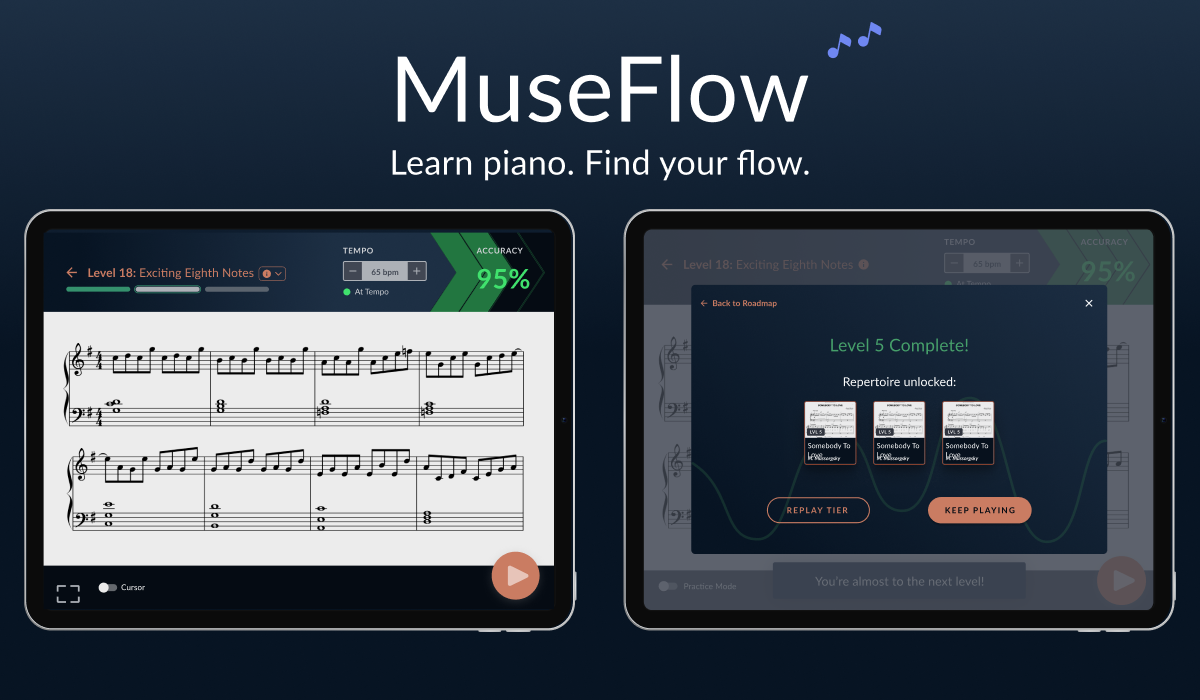
Conclusion
If left unchecked, focal dystonia can threaten to derail musicians’ careers. So it’s worth considering how we can reduce the possible risk factors in our music education.
It’s important to note that specific training methods can’t treat focal dystonia or guarantee you won’t develop it. Some people have genetic predispositions and prior injuries that make them more vulnerable to developing the disorder than others. But by focusing your music education around variation, flow, and positive reinforcement, you can support healthier motor learning principles.
And here’s the cool thing about ditching repetitive perfectionism…it can also make learning the piano a lot more fun.

Why Piano Needs to Be in Your Wellness Routine
Sometimes, the beginning of the year can bring stress, anxiety, or other emotional hurdles that we don't expect.
Prolonged stress and anxiety can result in respiratory problems, chronic pain, as well as a number of other issues - on top of just being plain unpleasant to deal with.
Studies show that learning to read and play music may improve mood and reduce depression symptoms.
Researchers discovered that subjects experienced relaxation, happiness, and increased tolerance of uncertainty. Novices to experts were given instruments to play and experienced these benefits over relatively short periods.
If you think about it, it makes sense that tolerance of uncertainty is a benefit of playing music. For one, jazz is highly unpredictable and requires a large amount of improvisation. You never know what’s going to come next. There’s a framework, but what’s being played within that framework is completely up to the other musicians you are playing with. Jazz is inherently uncertain.

How does music reverse the effects of aging?
There were also cognitive benefits in addition to improved mental health, including in aging adults and people with mild brain injuries. Increased dexterity and coordination resulted in an increased quality of life for a diverse group of people.
Music is one of those elements, like smell, that triggers memories in a very visceral way, especially when that memory isn’t able to be tapped into any other way. Unity Hospice summarized it well:
"when a dementia patient hears music connected to a memory, they can 're-awaken' and regain the ability to connect with people around them. Sometimes, people who haven't spoken for years find words and actually sing lyrics."
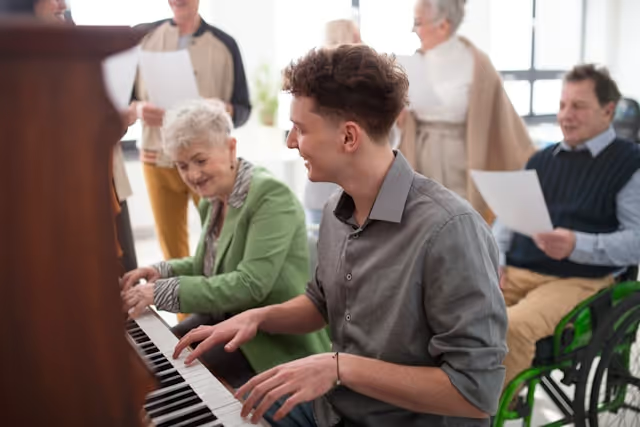
How does music actually improve mental health?
There are actually a few mechanisms through which playing music improves your wellness.
The multi-sensory workout of playing an instrument improves your executive function because the practice builds the corpus callosum, the area of the brain responsible for emotional regulation and problem solving. It’s a thick bundle of nerves that connect the right and left hemispheres and in musicians, it tends to be more developed. Over time, you can see improvement in executive function and even depression.
This is in addition to the feel-good neurochemical cocktail we get from music: dopamine (pleasure and motivation), oxytocin (the bonding hormone), and a significant drop in cortisol (the stress hormone). This naturally combats stress and anxiety.
How does music training actually improve cognition?
Music training requires complex fine motor skills, as well as increased attention and concentration. While studies reveal an increase in processing speed and improved executive function in both healthy and unhealthy individuals, the exact mechanism is still being studied.
Picking up the piano has been shown to improve cognitive function in mild brain injuries as well as mental illness. There is even a dedicated branch of therapy, known as music therapy, combining clinical research with music to address diagnoses.

What’s the difference between music therapy and music education for wellness?
Music therapy is a structured approach to accomplish a patient’s goals by a credentialed professional. It has been proven to help treat and improve a number of conditions from Parkinson’s to childbirth. It is an extremely beneficial approach that many can benefit from, but it is distinct from an ongoing practice for personal wellbeing and fulfillment.
The same mechanisms that make music therapy effective for treating a wide array of conditions are available to you, too.
Building Your Own Wellness Practice
Learning piano is a skill that you can have for life, can help you become more attentive and less stressed, and you can have fun while doing it! You can take advantage of the physical, emotional, and cognitive benefits and build a personal wellness practice for yourself.
- Start Small: I know these benefits are exciting, but there’s no need to dedicate more than 15-20 minutes of focused piano time to begin to see the benefits.
- Replacement: Choose one habit you’d prefer to replace, such as scrolling social media first thing in the morning, and practice piano instead.
- Habit stacking: Tack your practice onto another habit, and soon it becomes a reflex. As soon as you wash the dishes or finish walking the dog, sit down at the bench!
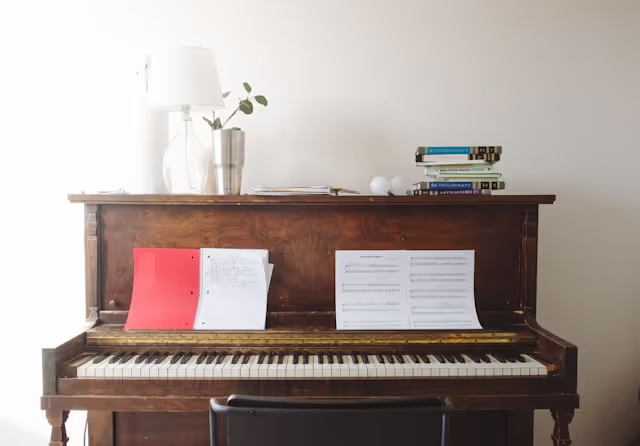
Conclusion
Music learning and wellness go hand in hand. If you’re ready to craft a unique, research-backed wellness practice for yourself, try MuseFlow! Our platform is designed not only for you to learn music in the most effective way possible, but to be engaged and motivated while doing it. MuseFlow is tailored to each pianist, allowing you to enter a Flow State; allowing you to increase skill acquisition, and decrease anxiety and boredom.
Optimize your wellness - try MuseFlow for free today.
Why Traditional Sight Reading Learning Methods Don't Work
Sight reading is the ability to play a piece on first sight. It’s a unique skill that requires reading, comprehending, and then translating sheet music in an instant. It involves deciphering rhythm, pitch, time pressure, and coordination…all at the same time.
The benefits of learning this skill are endless. As we talked about in our previous blog, sight reading:
- Is important for accompanists and members of orchestras, bands, and choirs
- Expands your repertoire
- Enhances your musical understanding
- Improves your versatility
- Boosts confidence.
- Raises your musical floor
A study in the International Journal of Music Education found that while sight reading is important, training is “often neglected,” even among advanced pianists.
But why is that? It may be in part because traditional piano learning systems are largely insufficient at helping you develop, track, and practice the skill.
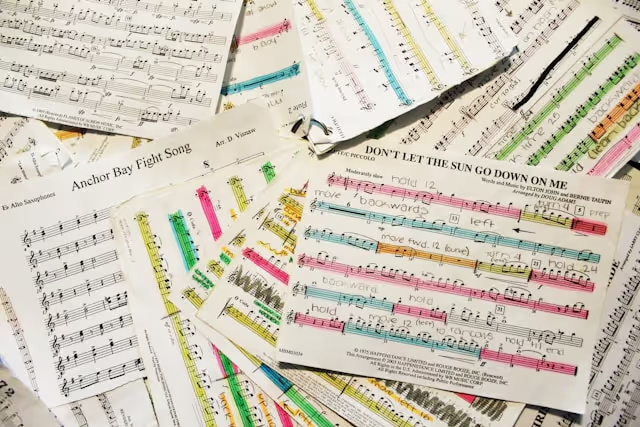
PIANO GRADING SYSTEMS DON’T PRIORITIZE SIGHT READING
We’ve talked in a prior blog post about the different piano grading systems. Music exam boards like ABRSM and RCM offer these systems to help pianists track their progress, set goals, and offer standardized certifications that musicians can use for college and job applications. While these can be very useful, we’ve found that they just don’t prioritize sight reading.
A major component of these grading systems is preparing, polishing, and performing a number of songs. Learning these songs:
- Expands your repertoire
- Helps teach you the technical skills needed to execute those songs
- Rewards repetition and memorization over real-time music reading
In most cases, sight reading is only a small component of the exam. For ABRSM, often seen as the standard for piano grading systems, sight reading makes up about 14% of a typical exam. In fact, across the board, sight reading tends to only occupy about 10-15% of piano grading exams.
But you don’t learn sight reading by polishing your repertoire…you learn it by playing music you’ve never seen before.

EXAMS LACK NUANCE WHEN IT COMES TO SIGHT READING
Within these grading systems, the sight reading component is usually graded on a pass-fail basis. You either succeed at the given level or you don’t. But sight reading is a lot more nuanced than that.
Your sight reading ability exists on a spectrum. You could have advanced skills of reading fluently at tempo but struggle with rhythms. You could move quickly at the keys you know well but freeze at the ones you don’t. It’s a nuanced skill, and your assessments should be similarly nuanced.
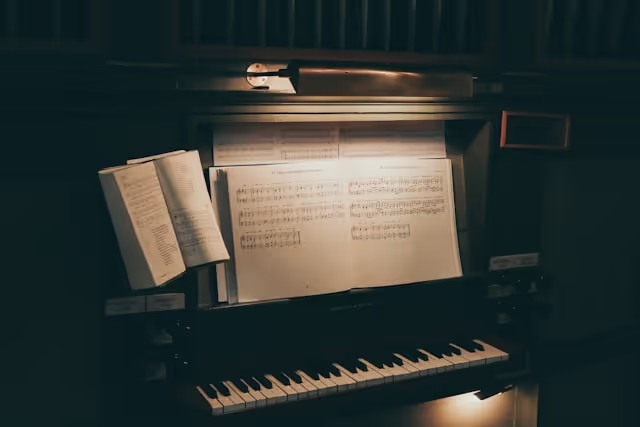
BOOKS JUST AREN’T ENOUGH
Just like every other aspect of playing the piano, learning sight reading requires practice. There are books that offer guidance and sheet music specifically for this. That could give you a good start, but you’ll always run into the same problem: running out of sheet music.
Sight reading involves playing a piece of music on your first exposure to it, so you can only really practice and get better if you have a steady stream of new-to-you songs. Sight reading books are finite resources that you’ll eventually read through and no longer have use for.
So if the traditional infrastructure for sight reading:
- Doesn’t prioritize it
- Lacks nuance
- Doesn’t offer enough material to actually practice
Then how are you supposed to actually learn it?

ENTER MUSEFLOW
This is where MuseFlow comes in. While most other piano learning systems treat sight reading as a secondary skill, MuseFlow treats it as a trainable system that’s foundational for your musical progress.
Compared to the pass-fail aspect of traditional piano exams, MuseFlow offers an adaptive, incremental approach to learning sight reading and tracking your skill level. When you play MuseFlow’s gamified system, the app gives you real-time feedback on the notes you play. So you’re able to see exactly where and how you can improve at any given level.
MuseFlow also introduces one new idea at a time, and you can change the tempo whenever you want less or more of a challenge. The hyper-specific nature of the program ensures that it’s always meeting you at your skill level and helping you along as you get better.
And perhaps most importantly, MuseFlow’s algorithm-based generative sheet music gives you an indefinite amount of songs. That means there’s no need to worry about running out of new-to-you music to practice your sight reading.
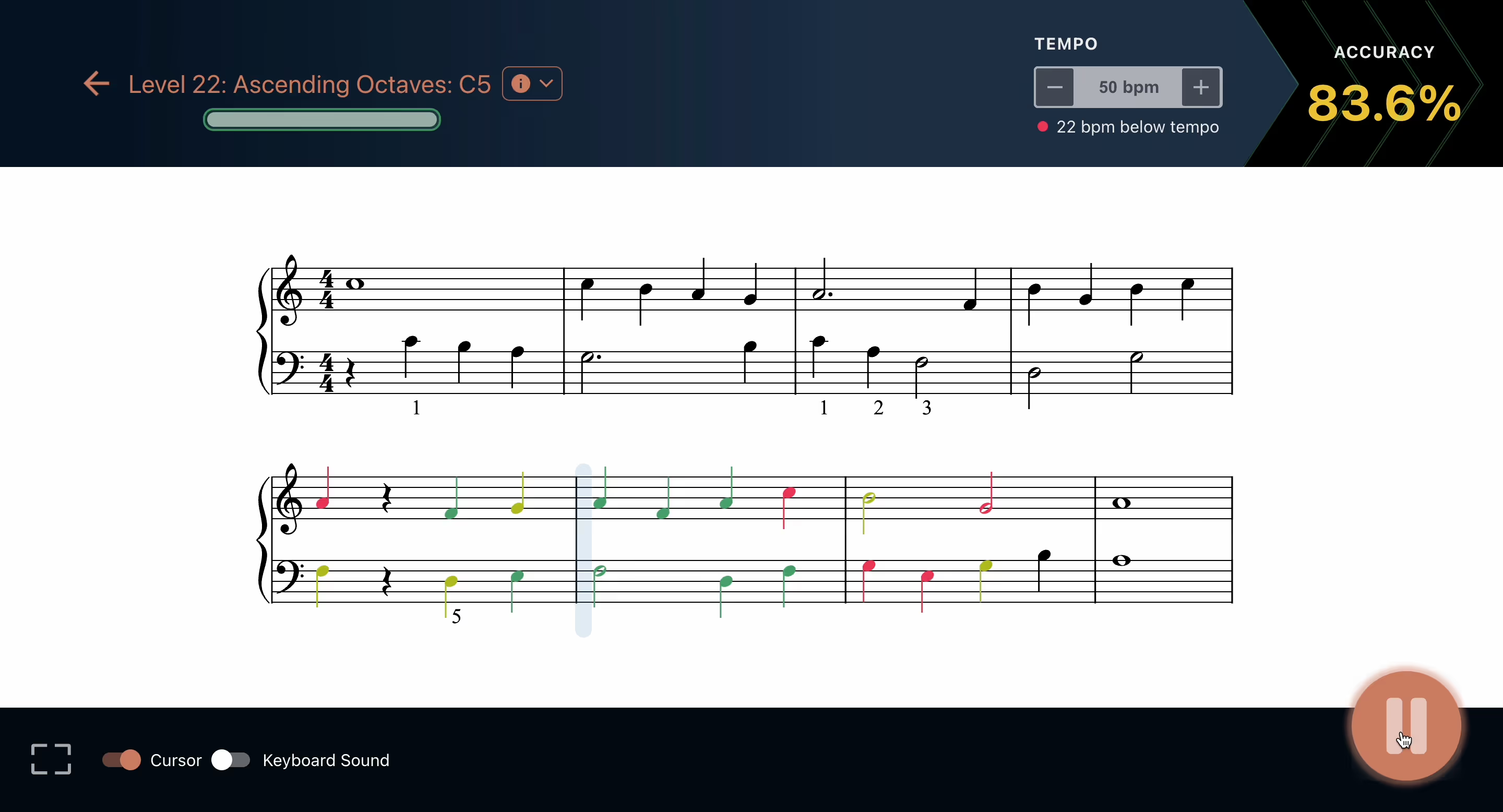
CONCLUSION
Sight reading is an essential building block to your musicianship as a pianist. But if learning this skill has ever felt hard for you, that’s totally normal! Traditional learning methods just haven’t been sufficient.
As opposed to traditional systems, MuseFlow:
- Gives a nuanced assessment of your sight reading
- Adapts to your specific skill level
- Offers indefinite music to practice
No matter your age and skill level, you can learn to sight read. All you need are the right tools!

Why the Piano is So Important
When you’re choosing a new instrument to learn, the choices can be daunting. There are literally thousands of instruments out there to choose from, but there’s nothing quite like the piano. That’s why we at MuseFlow offer a fun and effective way to learn this popular and enduring instrument. But what is it about the piano that makes it so important?

It’s Musically Versatile
The piano is one of the most played instruments in the world. And a big part of that is its versatility across musical genres. The soothing classical music of Beethoven’s “Fur Elise.” The energetic jazz riffs of Duke Ellington’s “Take the ‘A’ Train.” The emotional modern pop bop of Chappell Roan’s “Pink Pony Club.” The piano is a core, foundational component of all of these musical genres, as well as many others (R&B, electronic, musical theater, film scores, Bossa Nova, and Tango to name a few). When you play each genre, you’re introduced to new tempos, melodies, and styles of play. The combinations and play styles are truly endless.
So when you’re learning the piano, you’re really opening yourself up to an entire world of music!
.avif)
It’s A Composer’s Best Friend
Going along with its versatility, the piano is the perfect instrument for composers. That’s because you can play up to 12 notes at once, and it can act as a compression for entire orchestras, bands, and choirs. You can play the bass and rhythm with the left hand and melody and harmony with the right, with both hands operating at different registers, roles, and meters at the same time.
The piano is actually considered a percussion instrument that creates percussive, rhythmic, and immediate sounds when you press a key and the internal hammer strikes a string, or set of strings. But the sound created can also be a sustained pitch, which allows for lyrical, harmonic, and legato sounds. There’s no other instrument on Earth that can do all of this!
Before the invention of the piano, music composers needed access to entire ensembles to write songs. But since its invention, those ensembles have become available at composers’ fingertips. This makes composition more affordable and accessible. If you want to compose a song, all you need to begin is your piano!
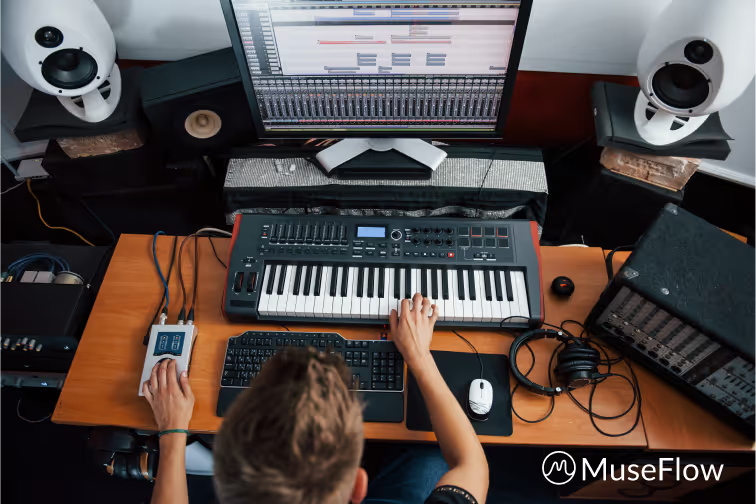
It’s Good for Your Brain
Learning the piano can be a fun way to challenge your brain. One study found that learning the piano can enhance your fine motor skills, since it’s an instrument that requires strong finger dexterity. The way your brain has to compute the sight reading and playing simultaneously can also activate two different parts of your brain at the same time.
It’s no surprise, then, that another study suggested that learning the piano can boost brain processing power. After just a few weeks of lessons, the participants’ ability to process multi-sensory information had improved. Amazingly enough, those participants also reported an enhanced mood, with less anxiety, stress, and depression!
So the next time you’re practicing the piano, you can know that you’re basically doing crunches with your brain.
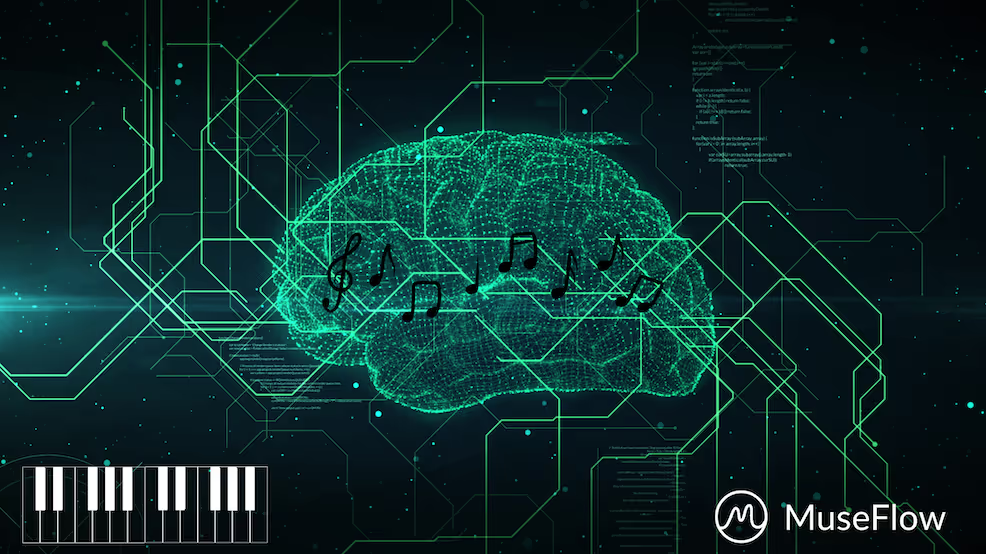
It’s Emotionally Resonant
The piano is powerful. A somber chord in a movie soundtrack can bring us to tears. A springy tune at a wedding reception can send everyone, including that one uncle who never dances, running to the dance floor. A new song can stop us in our tracks. A recognizable melody can immediately pull us back to the first time we heard it. There’s an emotional resonance that we get from the piano that’s hard to put into words. But we know it when we feel it.
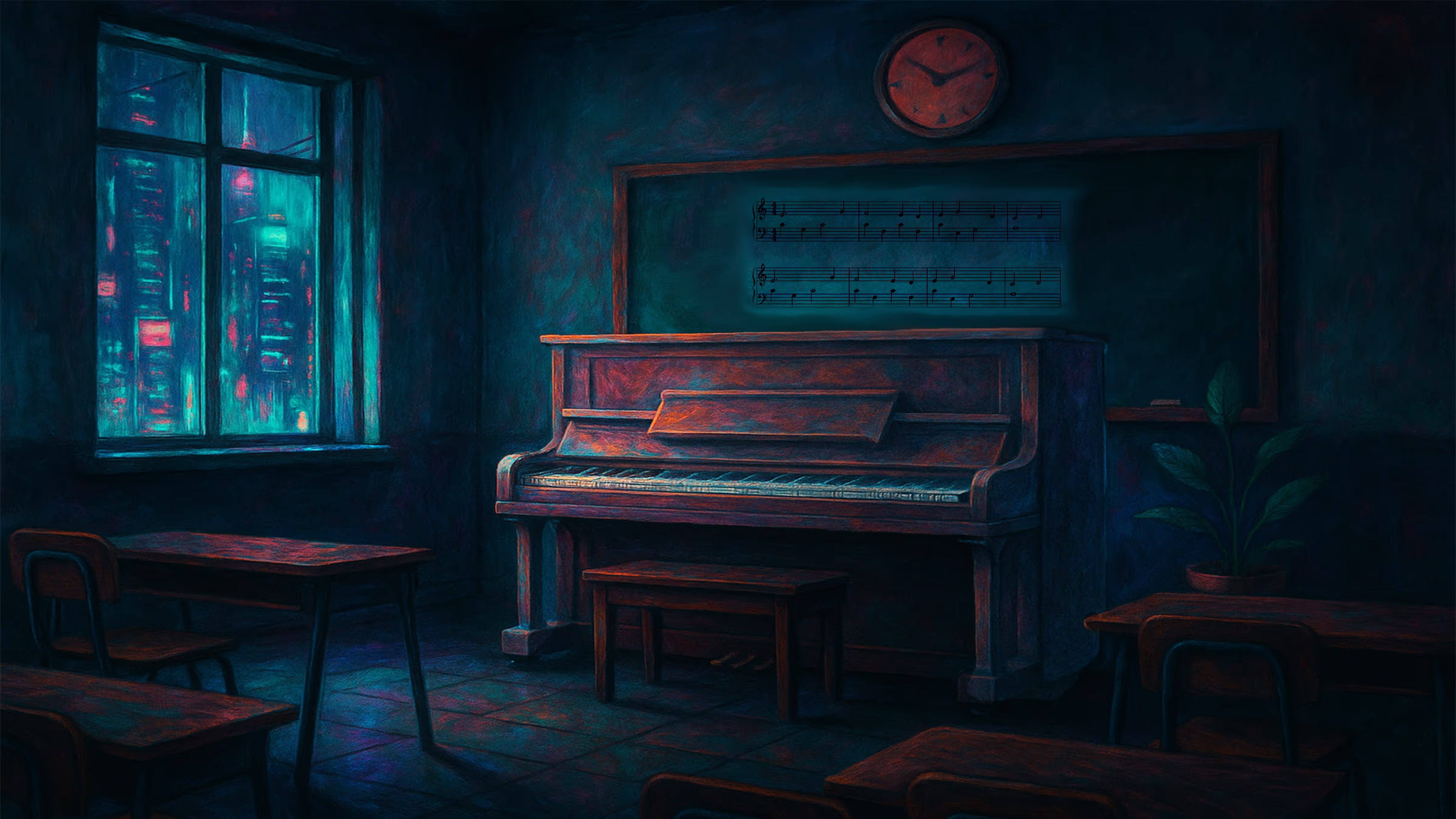
Conclusion
People have been playing this instrument since the 1700s. It’s been played for kings and queens. Its sound has filled massive stadiums of screaming fans as well as intimate living rooms with family and friends.
It’s an instrument unlike any other, able to stand in for just about any other instrument, even a full orchestra. You can play a limitless variety of music on those 88 keys. And since the piano doesn’t require size changes or “starter versions” like some other instruments, you can play a complex concerto on the same piano that you first learned “Ode to Joy” on.
The piano stands alone in its versatility, accessibility, and usefulness across musical genres. It’s a powerful and timeless instrument that has changed the worlds of music and composition forever. We’d say that makes it pretty darn important!

Why People Quit Learning Music
We here at MuseFlow know that there are as many different journeys to the piano bench as there are players - and just as many away from it, too. Below, we discuss the common reasons why people have trouble sticking with traditional music lessons and how the revolutionary app for learning piano MuseFlow challenges each one to help you learn to play, once and for all.
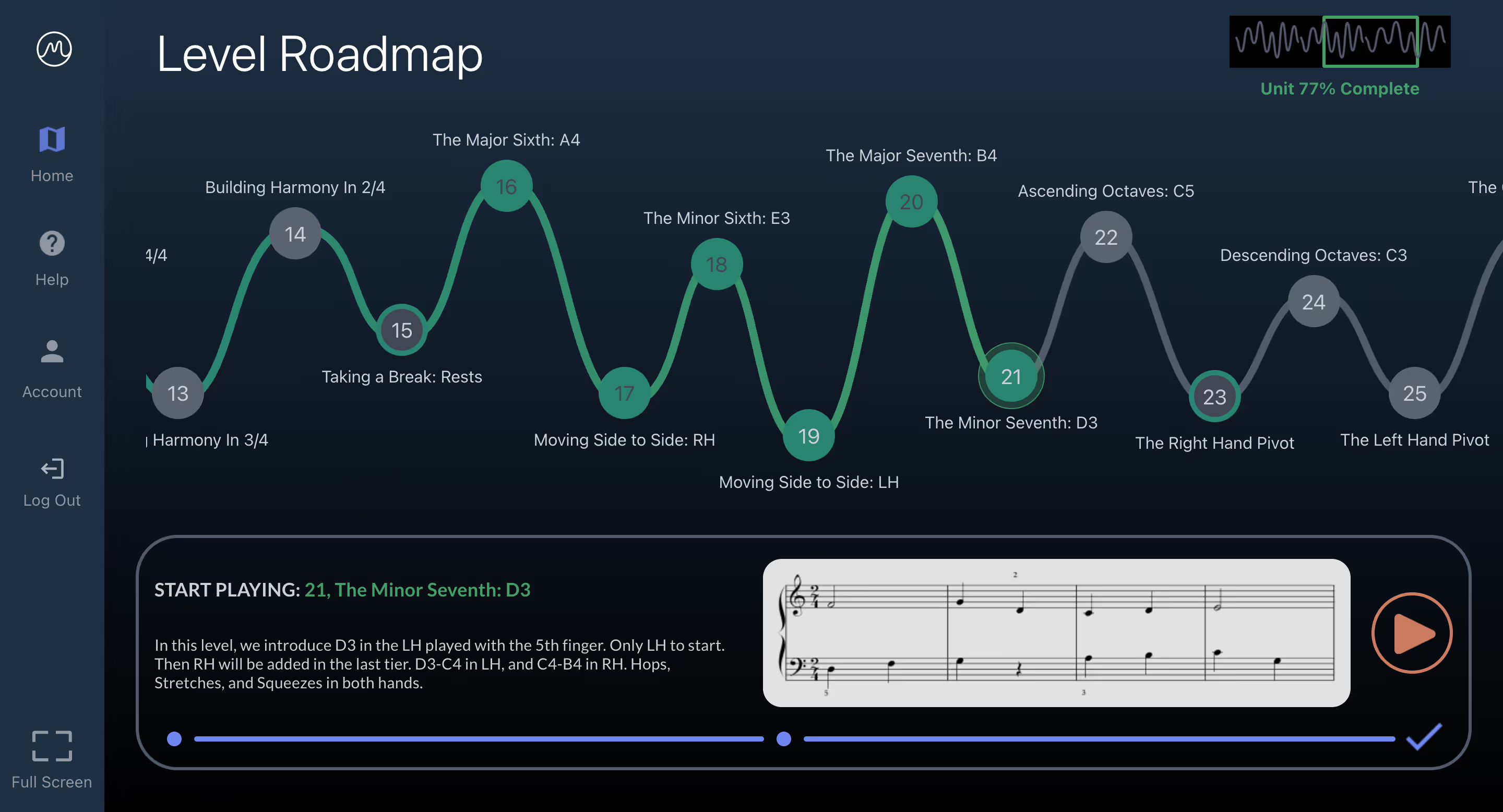
1. Boredom
THE PROBLEM:
Traditionally, music is taught by a model of rote repetition with limited sight reading development. In fact, many other music apps teach you using this method. While it is entirely possible to learn this way, it takes much longer and can lead to burnout from boredom - especially in fast, intelligent learners. This can also lead to poor retention, slowing progress.
THE SOLUTION:
MuseFlow’s ingenious gamified interface makes learning feel like play, introducing music that never repeats to keep your brain engaged. Our adaptive learning adjusts to your skill level, allowing you to get into a Flow State while learning, promoting deep understanding in the quickest, most fun way possible. Studies show that fun is one of the most important factors for sticking with learning music.
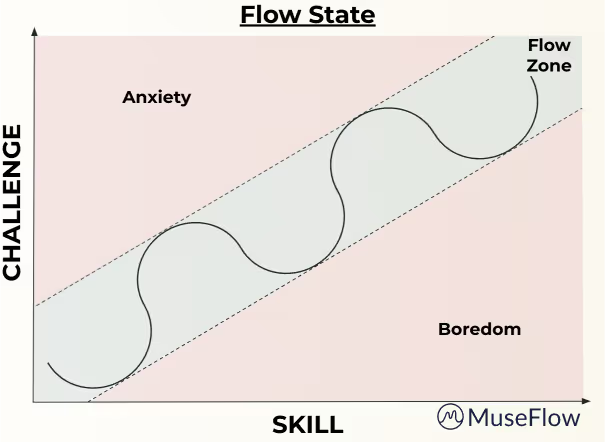
2. Socio-Economic Factors
THE PROBLEM:
The average music lesson in the United States in 2025 ranged from $280-$400 per month, not including access to music rooms throughout the week or purchasing books.
THE SOLUTION:
MuseFlow is a much more accessible piano learning option at $24.99 a month - including a free 14-day trial.

3. Shifting Priorities
THE PROBLEM:
Especially if you initially played as a child, shifting priorities as we get older splits our focus and our time. Many little virtuosos had to choose between music and other extracurriculars.
THE SOLUTION:
MuseFlow helps you learn to play piano in your own time, even if that’s only 15 minutes a day; in your own space, even if that’s the kitchen table. The MIDI integration allows for support of various keyboard sizes.
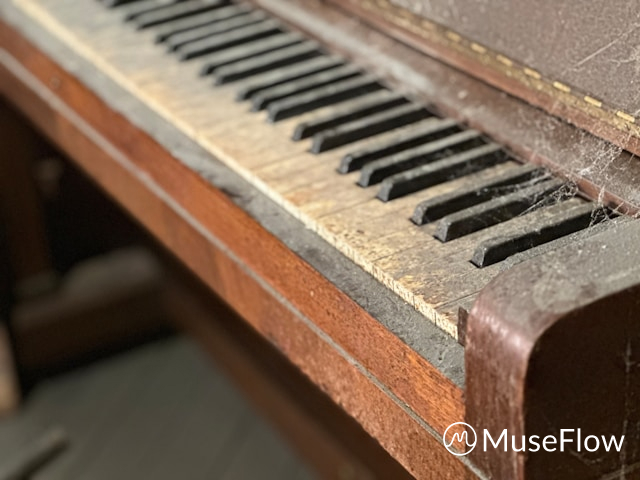
4. Environment
THE PROBLEM:
Anyone who has ever lived in an apartment, or with someone picking up the recorder, understands the limits of learning a new instrument in almost any home environment.
THE SOLUTION:
MuseFlow’s MIDI keyboard interface allows you to not only learn to play anywhere you can set up the app, but with a pair of headphones, you can play in any environment.
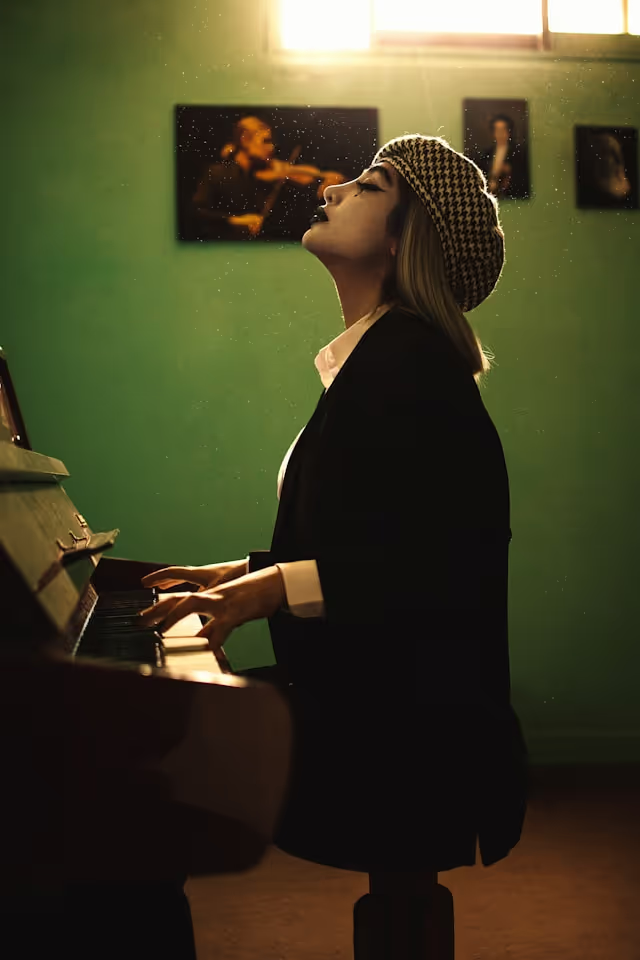
Lack of Feedback
THE PROBLEM:
When alone, it can be frustrating to practice repetitively without any indication whether you’re doing anything correctly or incorrectly. Especially when people are beginning to learn on their own, they can drop the practice due to this frustration. Even in classical piano training, with taking lessons once a week, practicing alone six days a week incorrectly reinforces bad habits.
THE SOLUTION:
MuseFlow provides instant, precise feedback to gently help you correct mistakes in real-time, and instant audio and visual confirmation when you get it right. This is especially useful for complete beginners and self-taught pianists, so you can build confidence and a solid foundation. Seeing the fruits of your labor and success as you go is likely to increase self-confidence and empower you to keep up with your practice.
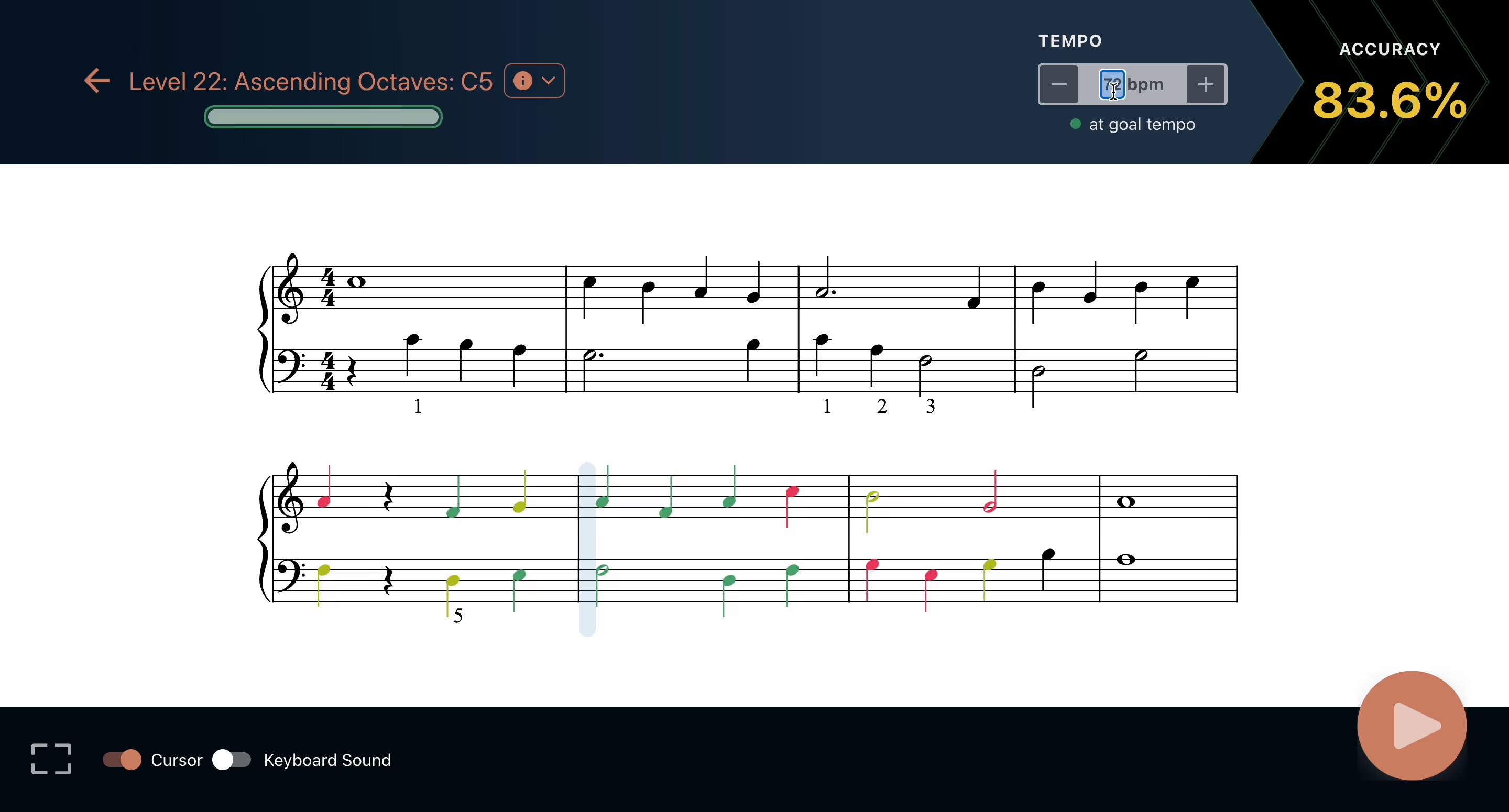
Time
THE PROBLEM:
I get it - you want to get right to playing your favorite songs ASAP! The traditional method of rote memorization of the basics definitely has its value, but it does put a damper on your Elton John dreams. Progress can feel like a slog through inefficient exercises through traditional exercises.
THE SOLUTION:
MuseFlow’s sight reading first approach teaches you to read your favorite music fluently; not just the ones you’ve memorized, so you can get started once you’ve mastered each lesson. MuseFlow’s adaptive structure also allows you to progress at your own pace.
Conclusion
MuseFlow empowers you, no matter where you are in your music learning journey, to reach your music goals by using revolutionary, research and experience backed design to help you overcome common pitfalls.

How to Learn Piano Without a Teacher: Self-Taught Guide with Real-Time Feedback
So, you want to learn piano without a teacher? It's a goal that millions of people share, and with a tool like MuseFlow, it's more achievable than ever. But the internet is full of myths and half-truths about what it really takes to succeed. Can you really do it? Let's debunk some common myths and reveal the reality of self-taught piano in the modern age.
Myth vs. Reality: Learning Piano on Your Own
Myth #1: You need a teacher to correct your mistakes.
The Old Reality: This used to be true. Without a trained ear to catch wrong notes, rhythms, or techniques, self-taught students would often ingrain bad habits that were difficult to fix later. You could practice for a week, only to find out you were practicing the wrong thing all along.
The New Reality: Real-time feedback is your 24/7 teacher. This is the single biggest game-changer for anyone wondering how to learn piano without a teacher. A revolutionary app like MuseFlow connects to your MIDI keyboard and provides instant, note-by-note feedback.
- Play a wrong note? You'll see it in red, immediately.
- Is your timing off? The notes will show up yellow, guiding you to tighten your rhythm.
- Play it perfectly? You get that satisfying flash of green.
This seamless feedback loop means you're correcting mistakes the moment they happen, not a week later. It's a more efficient, more precise way to learn. Research from institutions like MIT has consistently shown that immediate and consistent feedback is crucial for developing musical skills.
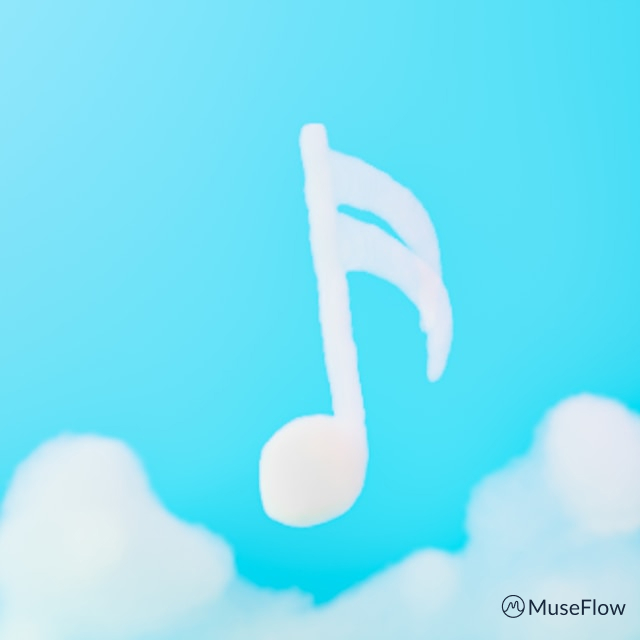
Myth #2: You won't learn proper technique without a teacher.
The Old Reality: A teacher is invaluable for showing you proper posture, hand position, and fingering. Without this guidance, self-learners were at risk of developing inefficient or even harmful habits.
The New Reality: Guided curriculum and visual aids build a strong foundation. While an app can't physically adjust your posture, MuseFlow's curriculum is designed to build technique systematically. The on-screen hand guides and clear visual instructions for fingering provide a strong starting point. More importantly, by focusing on sight reading from day one, you're training your hands and mind to work together efficiently. You're not just memorizing finger movements for one song; you're learning the universal language of music.
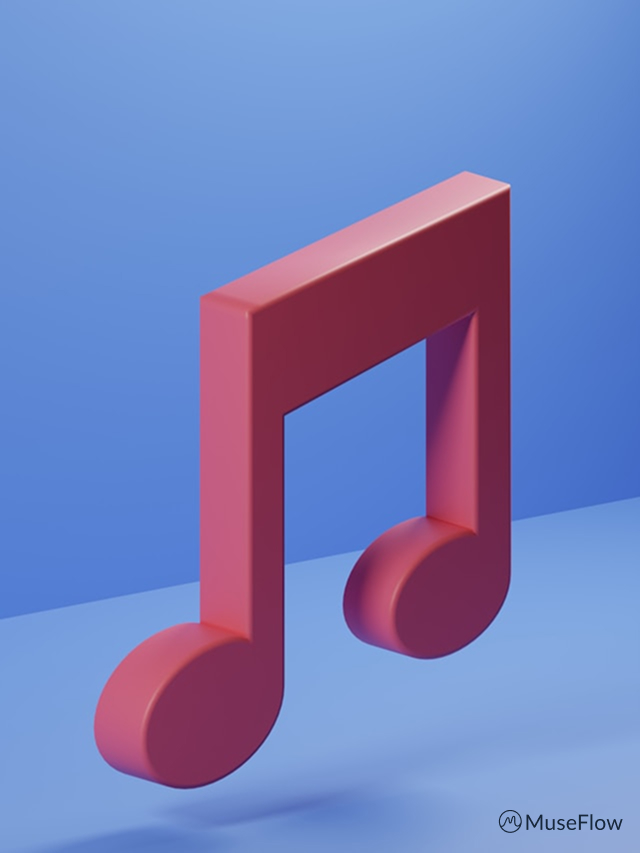
Myth #3: You'll get bored and lose motivation.
The Old Reality: This is a huge one. The lonely grind of practicing scales and drills from a dusty book is a notorious motivation killer. Without the accountability of a weekly lesson, it's easy to let practice slide.
The New Reality: Gamification makes practice feel like play. This is where modern tools truly shine. MuseFlow turns the entire learning process into an immersive game.
- You're not just practicing; you're completing levels and unlocking achievements.
- You're not just drilling; you're competing against your own accuracy score.
- You're not stuck on one boring piece; you have a vast song library to explore.
This ingenious approach keeps you engaged and creates a powerful sense of progress. When you can clearly see your skills improving every single day, motivation takes care of itself. This aligns with principles of Flow State, where challenge and skill are perfectly balanced to create a deeply satisfying experience.

Myth #4: You won't know what to practice next.
The Old Reality: A self-learner's journey was often a random walk through YouTube tutorials and method books. This lack of structure is confusing and inefficient. Do you learn chords first? Scales? Theory?
The New Reality: A clear, progressive path guides your journey. MuseFlow offers the best of both worlds: a structured 27-level curriculum that guides you from absolute beginner to advanced player, combined with the freedom to explore on your own. It's like having a campaign mode and an open-world in one. You can follow the proven path to build skills logically, or you can jump into the song library and tackle pieces that inspire you. This removes the guesswork and ensures you're always working on something that's both productive and enjoyable.
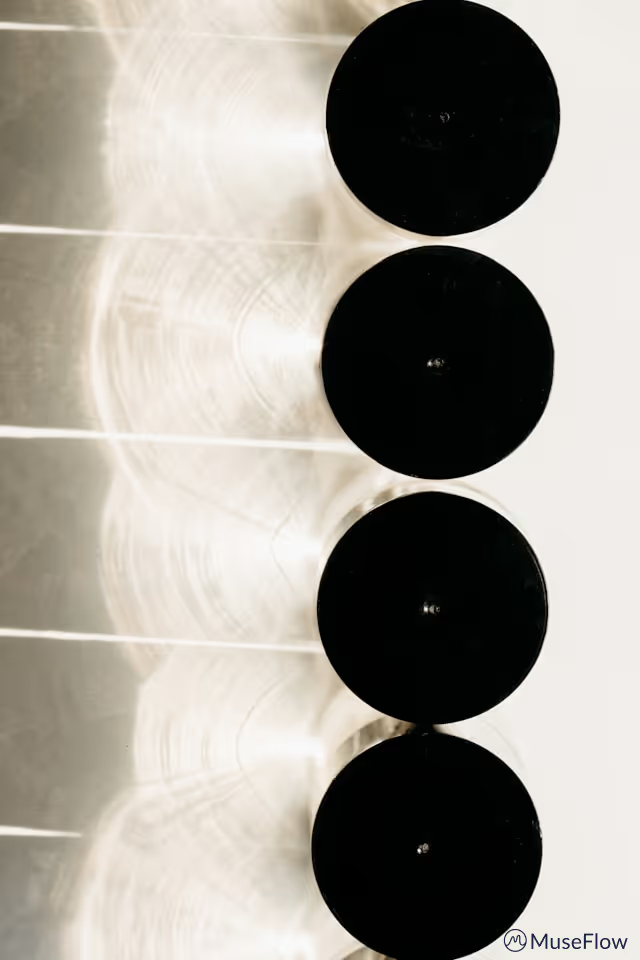
So, Can I Learn Piano Without a Teacher?
Yes. A thousand times, yes. The question is no longer if you can learn piano without a teacher, but how you do it. The key is to leverage technology that provides the essential elements a teacher once offered:
- Instant, Accurate Feedback: To correct mistakes in real-time.
- Structured Curriculum: To build skills in a logical order.
- Engaging Content: To keep you motivated and practicing consistently.
With a tool like MuseFlow, you're not just learning alone in the dark. You're learning with a powerful, responsive guide that's available anytime you are. It's a transformative approach that empowers you to take control of your musical journey. The benefits of learning an instrument are immense, and now, they are more accessible than ever.

Ready to start your self-taught journey the smart way? Try MuseFlow for free and discover how our real-time feedback can make you the musician you've always wanted to be.
Best Sight Reading App for Beginners: Learn Piano in 2 Minutes a Day with MuseFlow
Sight reading is one of the most important skills for pianists, especially for beginners. It enables musicians to interpret sheet music in real time instead of relying on memorization, opening the door to a broader repertoire and greater musical independence. Many adult learners struggle with sight reading because of limited practice time, inconsistent routines, or a lack of structured material. Even a few minutes of focused, high-quality practice can significantly improve fluency and confidence over time.
The “2-Minute Sight Reading Challenge” from MuseFlow demonstrates an approach designed to address these issues. By combining short, structured sessions with immediate feedback and varied exercises, this method provides an efficient pathway to developing sight reading skills.
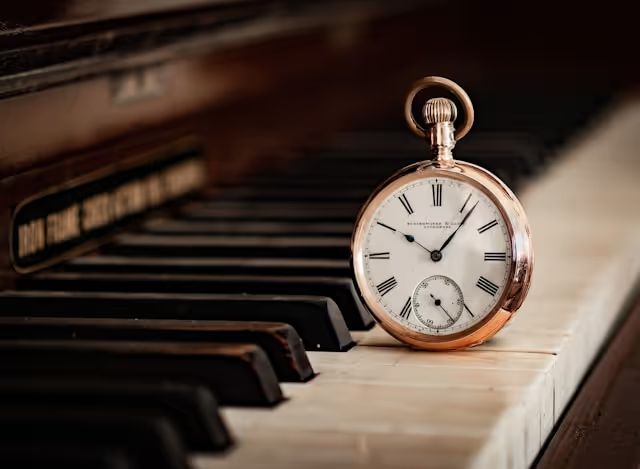
The 2-Minute Sight Reading Challenge
This method is simple and practical for beginners, particularly adults with limited time.
Step 1: Connect Your Instrument
Begin by connecting a MIDI keyboard to the MuseFlow app. Real-time feedback is central to this approach. Immediate correction allows learners to identify mistakes as they occur, reinforcing accurate patterns and reducing the chance of ingrained errors. Studies on learning show that instant feedback accelerates skill acquisition by strengthening neural pathways and supporting automatic recognition.

Step 2: Use the Sight Reading Trainer
Unlike traditional sheet music or fixed libraries, the Sight Reading Trainer generates an ongoing sequence of new exercises. This ensures that learners practice true sight reading rather than memorization. By encountering novel material at the right difficulty level, learners develop anticipation skills, pattern recognition, and adaptability—core components of fluent sight reading.
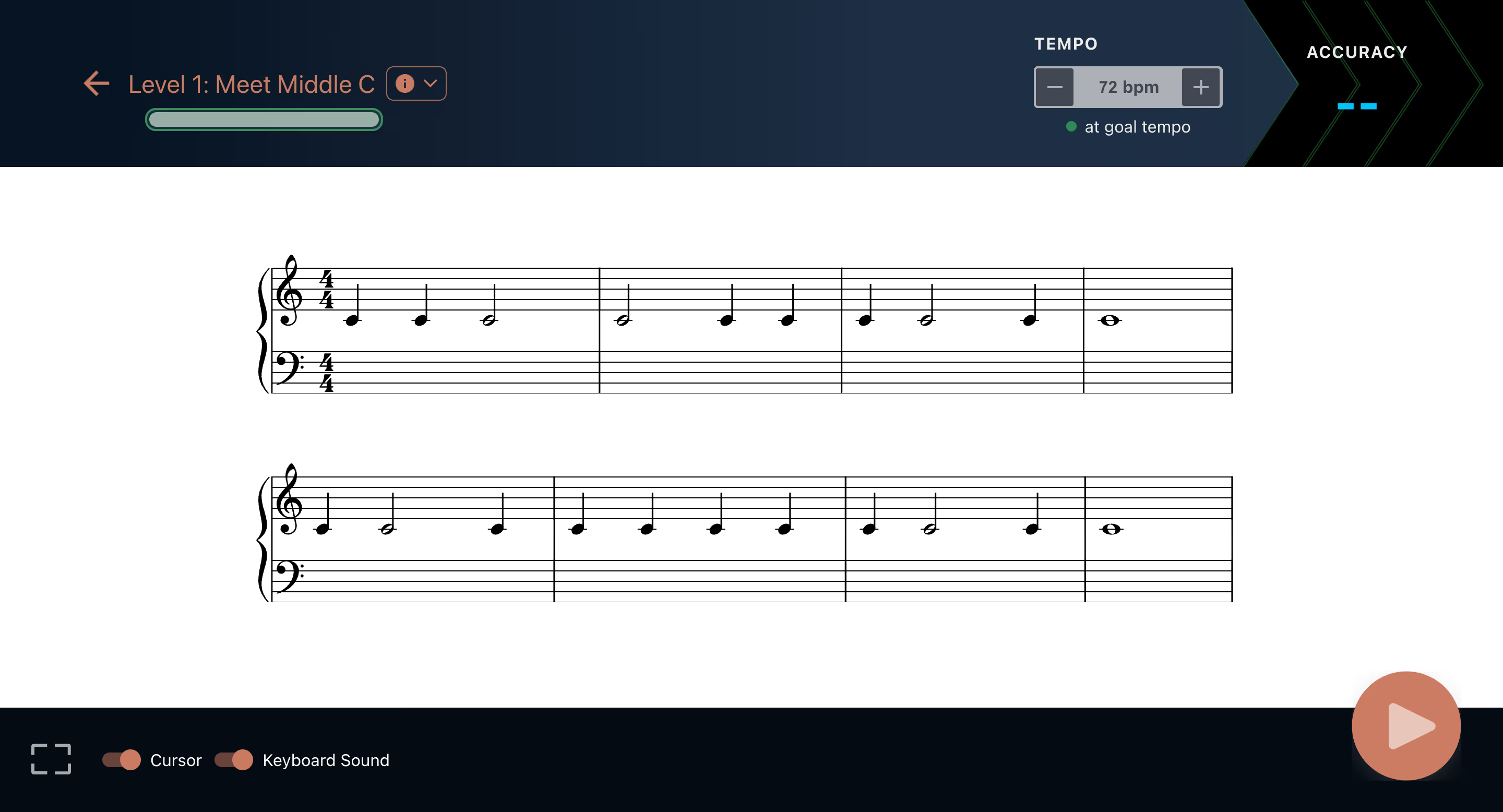
Step 3: Focus for 2 Minutes
Short, concentrated sessions are surprisingly effective. A two-minute commitment removes the mental friction of starting practice while encouraging full attention. Research indicates that brief, highly focused practice often produces better retention than longer, distracted sessions. Adults benefit from micro-practice sessions that fit into busy schedules, allowing consistent progress without feeling overwhelmed.
Step 4: Track Feedback in Real Time
Color-coded feedback—green for correct notes, yellow for timing adjustments, and red for errors—guides learners immediately. This enables rapid correction and reinforces proper technique. Immediate visual cues help learners internalize patterns more effectively than delayed feedback, which can slow progress and reduce engagement.

Step 5: Stop While Engaged
Ending practice at the point of peak engagement prevents fatigue and promotes a positive association with piano practice. Cognitive psychology research supports this strategy, showing that learners are more likely to sustain consistent routines when sessions end before exhaustion.
Why This Method Works
Several factors make the 2-minute approach effective for building sight reading skills:
- Reduces Starting Barriers: Short sessions make it easy to begin, overcoming the common obstacle of procrastination.
- Supports Focused Practice: Concentrated attention improves neural encoding, helping learners recognize musical patterns faster.
- Provides High-Volume Exposure: Algorithmically generated exercises introduce more musical variations in a short time than repetitive song practice, enhancing skill development efficiently.
- Encourages Consistency: Small, repeatable sessions create sustainable habits that support long-term learning.
The combination of these elements allows adult learners to steadily increase their sight reading fluency without overwhelming practice demands.

Cognitive and Musical Benefits
Sight reading practice offers benefits beyond simply playing new music. Consistent exposure to varied musical material strengthens memory, attention, and pattern recognition. It also enhances broader cognitive abilities such as problem-solving, auditory discrimination, and executive functioning. By developing musical literacy through structured practice, learners gain skills that contribute to overall cognitive flexibility and creative thinking.
Choosing an Effective Tool
Many apps focus primarily on memorization or gamification. While engaging, these approaches often fail to build genuine sight reading skills. A truly effective tool prioritizes structured progression, immediate feedback, and adaptive exercises that match the learner’s level. The 2-Minute Sight Reading Challenge demonstrates how short, well-designed sessions can produce measurable progress, even for busy adults.
Adopting short, repeatable practice sessions that gradually increase in complexity can help learners develop a foundation of sight reading skills that continues to grow over time. Combining focus, feedback, and varied material ensures that learners are not simply repeating the same exercises but are building real musical independence.

Conclusion
Evidence shows that short, structured practice sessions accelerate skill acquisition for beginners when combined with immediate feedback and clear progress tracking, an idea supported by research on microlearning and mastering skills in short time spans. By making practice approachable and rewarding, learners can steadily improve their sight reading and overall musicianship.
For practical guidance on integrating these principles into daily practice, see the MuseFlow blog for tips and example routines. By aligning piano practice with research-based learning strategies, beginners can build confidence, fluency, and long-term musical growth.

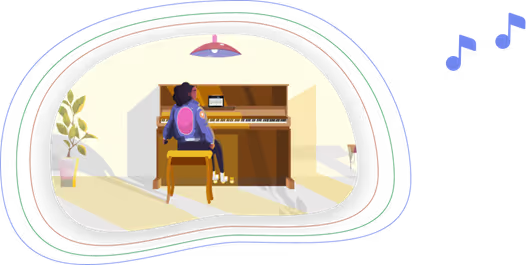
Try MuseFlow for Free!
Keep up to date on our progress as we continue to add new features!
